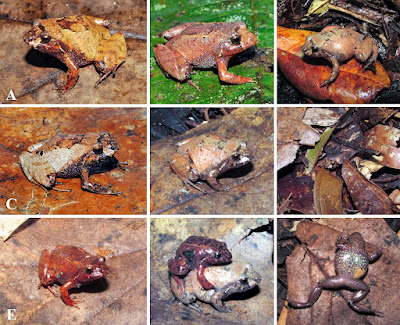Abstract
We describe a new species of Rain Frog from Brazil’s Atlantic Forest, which harbors high richness, endemism and threatened species of anurans. Ischnocnema crassa sp. nov. is a leaf litter breeder from the montane rainforest of Santa Teresa, state of Espírito Santo, southeastern Brazil. Remarkably, the new species is so far unique amongst Ischnocnema for having moderate hand webbing between fingers. Ischnocnema crassa sp. nov. is the third species belonging to I. parva series and we present a new phylogeny based on molecular data and propose a new diagnosis for the series. We provide field and laboratory observations regarding amplexus, antipredator mechanisms, microhabitat preferences and conservation remarks. Although Santa Teresa is one of the most sampled areas in Brazil, new species are often discovered. Santa Teresa is a priority for amphibian conservation because it harbors 109 species of anurans (9% of Brazil’s species).
Keywords: Amphibia, Ischnocnema crassa sp. nov., biodiversity, Espírito Santo, morphology, taxonomy, natural history, conservation
 |
| Ischnocnema crassa sp. nov. displaying antipredator mechanisms: (A) body inflation; (B) body elevation; (C) hiding and;(D) death feigning and body inflation with hidden aposematism. |
Ischnocnema crassa sp. nov.
Etymology. The specific epithet “crassa” (crassa = fat) is a Latin name here used as an adjective in allusion toits rounded body shape in general view. Typically, Ischnocnema parva series are usually more elongated.
Common name. Due to its rounded and robust body shape of this little inhabitant of the Brazilian Atlantic Rainforest, we designate to Ischnocnema crassa the common name of “rã gordinha de Santa Teresa”, which, in English, stands for “Santa Teresa’s Chubby Rain Frog.”
Thiago Silva-Soares, Rodrigo Barbosa Ferreira, Iago Silva Ornellas, Cássio Z. Zocca, Ulisses Caramaschi and Carlos Alberto Gonçalves Cruz. 2021. A New Species of Ischnocnema (Anura: Brachycephalidae) from the Mountainous Region of Atlantic Forest, southeastern Brazil, with A New Phylogeny and Diagnose for Ischnocnema parva Series. Zootaxa. 5082(3); 201–222. DOI: 10.11646/zootaxa.5082.3.1


